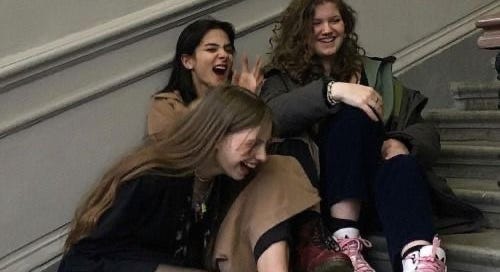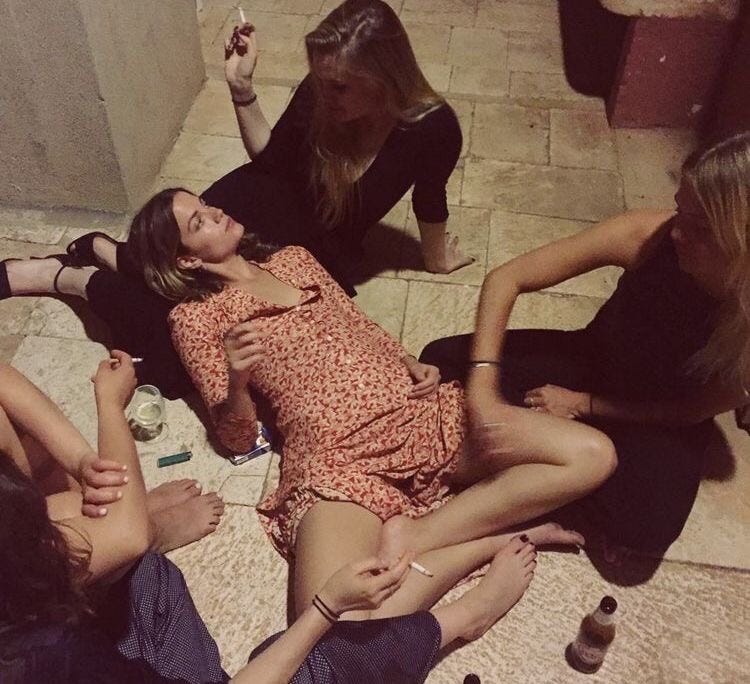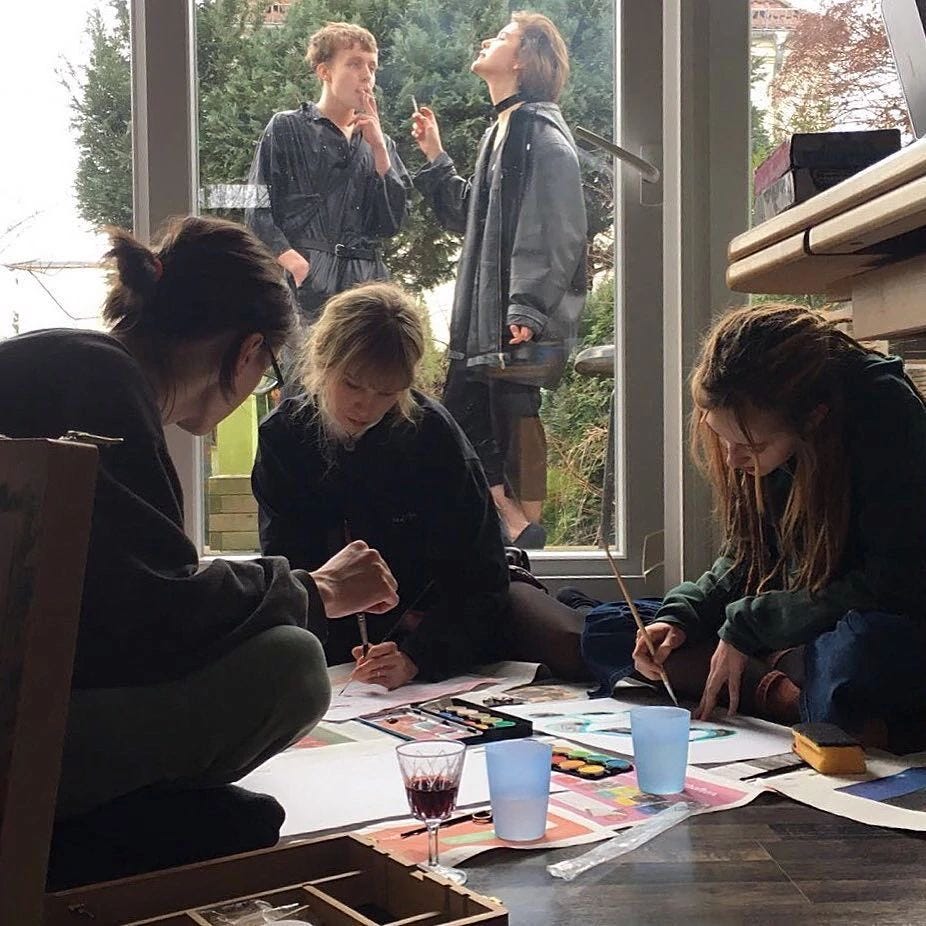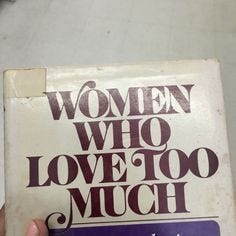hello.
expanding on a well-loved note…
when i was a young girl, i believed womanhood was an identity you stepped into, like a room waiting at the end of a long liminal corridor. there would be a unmistakable moment when you crossed a threshold and everything would change: a sudden understanding of effortless empathy, nursing and swaddling a baby in your arms, cooking a three course meal for your lover and the ability to transform pain into resilience- an ominous path being force fed down my throat. in my mind, womanhood was something autonomous and self-contained. it was about me—my growth, my maturity, my self-discovery.
i watched my mother deteriorate after my father cheated on her and left her and my brother and i when i was 9 years old. the once strong and independent life of the party reduced down to half-formed version of herself. defeated, lost, guilty- an amalgamation of emotions that sent her spiraling. but despite it all, she fought for my brother and i and continued to love and support us almost more than she did before.
the fun stickers on our lunch bags that reflected the upcoming holidays, sneaking my best friend and i starbucks at lunchtime during school on a random tuesday in between her patients at work, driving me to 4 hours of ballet rehearsals and my brother to ice hockey games every single week, making homemade valentine’s day card to pass out to my classmates at school, being the room mom and bringing cookies and sweet treats to my classroom, baking cookies at home on a friday afternoon, tucking me into my favorite spot on the couch with a blanket fresh out of the drier to make it warm whenever i was sick. the list goes on and the love she has for my brother and i has only grown stronger over the course of my life.
the older i’ve gotten, the more i realized that womanhood is less about stepping into yourself and more about stepping back into where you came from- a process of excavation, sifting through the layers of your mother’s life. her choices, her wounds, her silences bleeding into roadmap of your destiny- a book or how-to guide about how to live a life. it is a slow unraveling of the narratives you constructed about her when you were a child—the good and bad. the simplified stories that reduced her to a function. and it is in that unraveling that you begin to understand that your existence is predicated on an amalgamation of all the things you wish she was and all the things you’re not.
simone de beauvoir once wrote, “one is not born, but becomes, a woman.” this deceptively simple statement contains layers of meaning that unfold with reflection. for de beauvoir, this becoming is shaped not only by societal expectations—the roles, norms, and narratives imposed on women—but also by the cumulative weight of history: the traditions, generational traumas, and inherited silences that define so much of what it means to exist as a woman in any given era. yet, beyond these external forces, i think this becoming is also shaped by something deeply intimate: the process of seeing your mother as a person.
as children, we are solipsists. we inhabit a world where our parents are not separate beings with their own lives, but extensions of our own needs, wants, and fears. our mothers are caregivers, boundary-setters, providers of comfort and stability. they exist, in our early understanding, to serve us. but this perception is fragile, and as we grow older, the edges of that solipsism blur. the carefully constructed image of our mothers as omnipotent and infallible begins to crack, revealing the human beneath.
this shift is not a singular moment but a gradual unveiling, often marked by moments of clarity and confrontation. we begin to see our mothers not as static figures, but as dynamic, complex individuals—women with their own fears, desires, and contradictions. women who were once daughters. this realization can be both unsettling and liberating. unsettling because it disrupts the mythology of the mother figure we carried from childhood, and liberating because it allows us to see her fully, in all her complexity.
this process is not linear. it is fragmented, often painful. there are moments of clarity when you see her fully, when her humanity feels like a revelation. and there are moments when she remains opaque, inscrutable, a mystery you can’t quite solve. existentialist philosophy often speaks of “being-in-the-world,” a concept heidegger used to describe the way we exist in relation to others and to our environment. in many ways, understanding your mother is an exercise in being-in-the-world: it requires you to see her not as an object of your childhood projections but as a subject in her own right, someone whose existence is as nuanced and multifaceted as your own.
there were times in my life when i resented my mother deeply for what i perceived as her inability to stand up for herself. one moment, in particular, looms large in my memory: when my father sent me away as a teenager, cutting me off from the life i knew and placing me in a situation that was dangerous and unsafe, leaving me profoundly broken. (think the program) i waited—desperately, achingly—for her to come and save me, to pull me out of the destruction i was drowning in. but she never came. for years, i carried that anger with me, turning it over in my mind as proof of her failure, her weakness. it became a cornerstone of my resentment, a narrative i told myself to make sense of the pain.
it wasn’t until much later—only recently, really—that i began to understand her silence differently. i came to the startling realization that before she was my mother, she was someone’s daughter. she was shaped by her own history, by wounds and constraints that i had never fully acknowledged. her decisions, or lack thereof, weren’t born of indifference or malice but of her own complex survival mechanisms—mechanisms forged long before i ever entered the picture. this understanding didn’t erase the hurt, but it reframed it. it allowed me to see her as a person navigating her own fears, her own limitations. and in that shift, i found a way to let go of the bitterness, to forgive her for the enabling behaviors i had held against her for so long. forgiveness didn’t come as a dramatic epiphany but as a quiet acknowledgment of her humanity—and, by extension, my own.
nietzsche’s concept of eternal recurrence—the idea that life is a cycle, endlessly repeating itself—takes on a particular poignancy when applied to the relationship between mothers and daughters. how much of our lives are echoes of theirs? how often do we repeat their mistakes, their triumphs, their patterns of thought? and yet, even as we inherit so much, there is a tension between continuity and individuality. we are not merely our mothers’ reflections; we are also their contradictions, their resistances, their evolutions.
but this divergence is not always clean or complete. it is marked by ambivalence—by the simultaneous pull of inherited patterns and the desire to break free from them. we may find ourselves embodying traits we once vowed to reject, or pushing against aspects of their lives only to later discover their logic in our own. understanding our mothers, then, is not just about seeing the ways we are shaped by them but also recognizing the moments we reshape ourselves. in this dialogue between repetition and transformation, we begin to see that our differences do not sever us from them but deepen the connection, making it more nuanced, more human, and, perhaps, more enduring.
there’s an ambivalence of motherhood: a simultaneous love and rage, the intimacy and alienation- a paradox of the mother-daughter relationship. to understand your mother is to grapple with this ambivalence, to hold space for both gratitude and resentment, for admiration and critique. it is to see her as both the source of your being and a person shaped by forces beyond your control—forces that, inevitably, have shaped you too.
this process is not just about the past; it is also about the future. as we come to understand our mothers, we begin to see how we might mother ourselves.
womanhood, then, is not a destination but a dialogue. a conversation between who you are and who your mother was, between the expectations placed upon you and the choices you make to either fulfill or resist them. it is a negotiation of identities, a weaving together of narratives that are both inherited and self-authored.
there is a certain grace in this process, a beauty in the act of seeing your mother clearly—not as an ideal or a villain but as a woman who, like you, is still in the process of becoming. it is through this act of understanding that we come to understand ourselves, not as isolated individuals but as part of a continuum, a lineage, a shared human struggle. and perhaps, in the end, that is what womanhood truly is: not the act of stepping into a room but the act of turning around, of looking back, and of seeing—for the first time—the woman who made you possible.
if you’re new to milk fed, whenever i write essays like this i always make it a point to provide literature and film recommendations for further exploration and deeper study. so let me share some of those with you below…
books
the second sex by simone de beauvoir
a foundational feminist text that examines what it means to “become” a woman, addressing societal structures and personal relationships that shape womanhood.
of woman born by adrienne rich
a deep exploration of the institution of motherhood, its complexities, and the ambivalence inherent in the mother-child relationship.
beloved by toni morrison
a haunting narrative about motherhood, memory, and the sacrifices made in the name of love and survival.
meditations by marcus aurelius
while not explicitly about womanhood, this stoic classic offers profound insights into self-reflection, legacy, and living authentically—concepts that resonate with the exploration of generational ties.
the bell jar by sylvia plath
a semi-autobiographical novel that delves into identity, societal expectations, and the complexities of mental health, with a deeply introspective lens on womanhood.
middlemarch by george eliot
a rich tapestry of life in a provincial english town, eliot examines moral complexity, personal growth, and the ways women navigate societal constraints.
to the lighthouse by virginia woolf
woolf captures the fragmented, often unspoken dynamics of family life, particularly the roles of mothers and daughters, and weaves them into a meditation on time and memory.
anna karenina by leo tolstoy
a timeless exploration of love, morality, and the societal pressures placed on women. anna’s journey reflects the tension between personal desires and imposed expectations.
the ethics of ambiguity by simone de beauvoir
this philosophical work delves into freedom, responsibility, and the ambiguity of human existence, offering a framework for understanding the choices and contradictions of womanhood.
agnes grey by anne brontë
a classic that portrays the quiet struggles of a governess and reflects on themes of female independence and moral fortitude.
a room of one’s own by virginia woolf
a seminal feminist text that examines the relationship between women, creativity, and societal constraints, asking what it truly means to carve out a space for oneself.
the house of mirth by edith wharton
a critique of societal expectations placed on women, this novel follows lily bart as she navigates the intersection of wealth, love, and personal integrity.
my brilliant friend by elena ferrante
a novel that beautifully captures the tension between mothers, daughters, and the influence of upbringing on identity, set within the framework of a lifelong female friendship.
the glass essay by anne carson
a long poem reflecting on the poet’s relationship with her mother, weaving in themes of love, loss, and emily brontë.
films
lady bird (2017)
a poignant coming-of-age story that captures the love, resentment, and misunderstandings that define many mother-daughter relationships.
the virgin suicides (1999)
a haunting look at the lives of five sisters and their overbearing mother, examining the fragility and complexity of adolescence and maternal control.
all about my mother (1999)
pedro almodóvar’s masterpiece about loss, resilience, and the evolving roles of mothers and women.
pieces of a woman (2020)
a raw and intimate portrayal of grief, motherhood, and the ripple effects of tragedy.
the joy luck club (1993)
an intergenerational tale that weaves together the lives of chinese-american daughters and their immigrant mothers, exploring cultural identity and maternal bonds.
terms of endearment (1983)
a classic that delves into the complexities of mother-daughter relationships, marked by love, conflict, and mutual growth.
little women (2019)
greta gerwig’s adaptation of louisa may alcott’s novel, a celebration of sisterhood, individuality, and maternal influence.
the farewell (2019)
a deeply moving exploration of familial ties, cultural expectations, and the unspoken connections between generations.
roma (2018)
a semi-autobiographical film that beautifully portrays motherhood, caretaking, and the intersection of personal and societal struggles.
portrait of a lady on fire (2019)
while primarily about a romantic relationship, it reflects on how women navigate their roles and relationships within societal constraints.
the double life of véronique (1991)
krzysztof kieślowski’s philosophical exploration of identity and connection, capturing the mysterious, often spiritual ties that bind people across time and space.
okay, that’s all i have for you today.
i recently launched a youtube channel called dearmilkfed - an extension of this substack. it would mean the world to me if you could go support my channel and subscribe. i’ll be posting long form video content 1-2 times per week.
if you’re not ready to become a paid subscriber and you have the capacity to leave a tip, that would be so appreciated.
i love you.
bye.
(follow ig, tiktok, youtube, pinterest and spotify for more)









I really loved reading this. I especially loved the mention of your resentment of your mom and then your realization of what that really was: "it wasn’t until much later—only recently, really—that i began to understand her silence differently. i came to the startling realization that before she was my mother, she was someone’s daughter. she was shaped by her own history, by wounds and constraints that i had never fully acknowledged. her decisions, or lack thereof, weren’t born of indifference or malice but of her own complex survival mechanisms—mechanisms forged long before i ever entered the picture. this understanding didn’t erase the hurt, but it reframed it. it allowed me to see her as a person navigating her own fears, her own limitations. and in that shift, i found a way to let go of the bitterness, to forgive her for the enabling behaviors i had held against her for so long. forgiveness didn’t come as a dramatic epiphany but as a quiet acknowledgment of her humanity—and, by extension, my own." -- How you quietly came to understand that she was also a woman navigating her own path. As we get further away from adolescence and even early adulthood, we do begin to have a better understanding or realization of our parents as people. xxoo
whenever i read about motherhood, i cant help thinking about abba's song slipping through my fingers. it always brings me to tears.